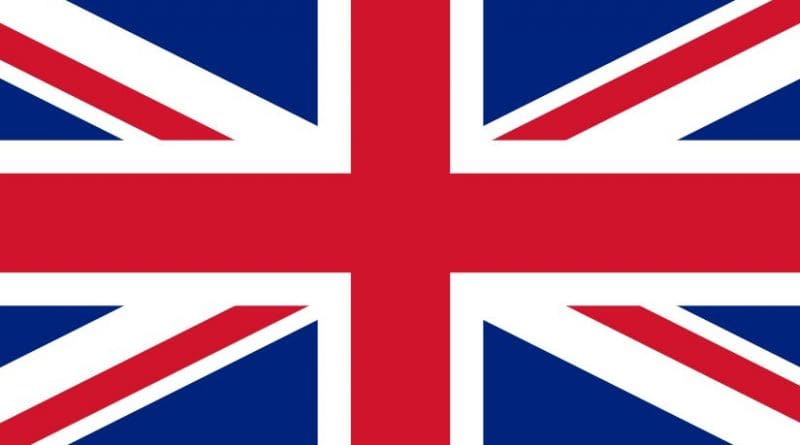An Awkward Embrace: The UK’s Re-Emerging Role In The Middle East – Analysis
By FRIDE
By Edward Burke*
Britain played a dominant role in Middle Eastern affairs for much of the 19 century and first half of the 20th. The year 1956 marked the beginning of the end of the British Empire in the Middle East: weakened by the economic destruction of World War II, the United Kingdom (UK) – together with France and Israel – was forced to cede control of the Suez Canal. London gave up Aden Colony in 1967 and its Trucial States protectorates – Bahrain, Qatar, the United Arab Emirates (UAE) and Oman – in the 1970s. The United States (US) took Britain’s place as the most influential Western power in the region. But British policy-makers now say that the trend of decline has been reversed – the UK’s commercial footprint, especially in the Gulf, is growing. Britain has the strongest political, security and business relations of any European country with the Gulf. And London wants things to stay that way.
The UK’s Enduring Interests
Britain’s interests in the Middle East are security and commerce, with security concerns coming first. In the 2010 Strategic Defence and Security Review, the UK government stated that transnational Islamic terrorism is the greatest threat to its national security.
The Middle East region lags far behind markets in Europe, Asia – particularly China – and the United States in relative economic importance for the UK. But the substantial increase of UK exports to the UAE and the other members of the Gulf Cooperation Council (GCC) in recent years, growing imports of liquefied natural gas (LNG) from Qatar, and the huge investment in the UK from Gulf States, have underlined the potential to develop the UK’s commercial relationship with the Middle East and North Africa (MENA) region. UK trade with Arab countries increased by 11 per cent in 2013 compared with 2012.
In 2013, UK exports of goods and commodities to the UAE exceeded US$15 billion – a three-fold increase in less than five years and approximately 2 per cent of total exports for that year. Meanwhile, exports to Saudi Arabia increased by approximately a third during the 2008-2013 period. Britain in turn attracts high levels of investment from the Gulf. The Dubai port operator – DP World – is investing in the construction of the first major UK port for 20 years. Gulf Sovereign Wealth Funds have made high-profile investments such as London’s signature ‘Shard’ building. British trade with Israel has also grown by approximately a third in the last decade. Britain is anxious to protect and deepen this growing trade relationship as a central dimension of its political outlook towards the region. Meanwhile, the Suez Canal in Egypt remains the vital conduit for UK exports to emerging markets in Asia (see Figures 1 and 2).
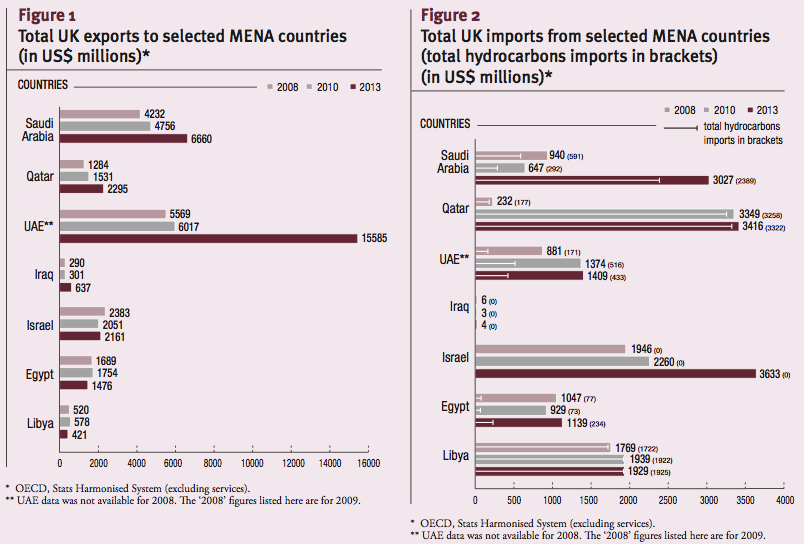
The MENA also remains a key market for British manufactured military equipment – representing over two-thirds of new defence export contracts signed with UK companies in 2013. Although the figures fluctuate, according to the UK Department of Trade and Industry (DTI), the UK’s share of the global defence export market in 2013 was 22 per cent or UK£9.8 billion. The DTI reported that defence contracts in the Middle East were worth almost US$60 billion for the period 2004- 2013. It has also reported a marked increase in major orders from the Middle East since 2012, including from Oman and Saudi Arabia (Hawk training aircraft and Typhoon fighter jets).
UK exports of military or police arms and other equipment sit uneasily with Britain’s human rights policy. Trade interests normally win out – in November 2013, the UK government resumed some arms and police equipment exports to Egypt less than three months after a deadly military crackdown on supporters of the country’s ousted former President Mohamed Morsi.
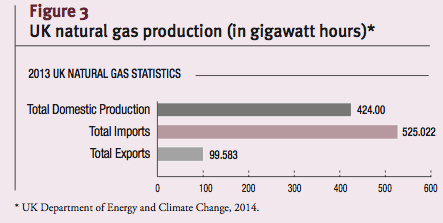
The introduction of a new Arms Trade Treaty, ratified by the UK in 2013, could affect future exports to the region – the treaty obliges exporting countries to make a reasonable judgment on the likelihood of the arms sold being used for human rights abuses. Each signatory – including the UK – is obliged to incorporate the treaty into its national laws. In August 2014, the UK threatened to suspend twelve arms export licenses to Israel if there was further evidence of large civilian casualties during Israeli military operations in Gaza.
The UK has traditionally been one of Israel’s strongest international supporters, but British attitudes towards Israel are changing. London recently backed European Union (EU) efforts to identify and label goods produced on Israeli settlements in the West Bank. Meanwhile, against Israel’s wishes, in June 2014 the British government backed a ‘unity accord’ between Fatah and Hamas – a shift in UK policy and an implicit acknowledgment that Hamas is an integral part of any revived peace process.
In August 2014, Prime Minister David Cameron used unusually strong language to condemn the recent building of settlements in the West Bank. Later that month, he condemned the annexation of 1,000 acres near Bethlehem as ‘utterly deplorable’. Cameron also supported the United Nation (UN) Secretary-General Ban-Ki Moon’s description of the attack on a UN school in Rafah ‘as a moral outrage and a criminal act’.
Energy Producer Turned Consumer
The UK is the largest producer of oil and the second-largest producer of gas in the EU. However, the UK became a net importer of hydrocarbons in 2004 because of dwindling supplies from the North Sea and a prolonged (ongoing) debate over shale gas exploration. UK natural gas production has fallen more sharply than domestic oil supplies in recent years (see Figure 3).
Domestic production met 61 per cent of demand for oil products in 2012, and imports constituted the remaining 39 per cent. According to the UK Department of Energy and Climate Change, oil imports are set to rise – net oil imports will likely constitute 20 per cent of primary energy supply by the mid-2020s and almost 25 per cent by 2030.
The UK has invested heavily in its capacity to import and store liquefied natural gas, which in turn has seen a significant increase in gas imports from the Gulf. The UK is now the largest market for LNG in the EU, surpassing Spain in 2011 (reflected in the exponential rise of Qatari imports in Figure 2 between 2008 and 2013). However, Norway will continue to be by far the most important source of UK imports for the foreseeable future, both for oil and gas – Norwegian exports to Britain are set to increase in 2014 following the essential maintenance of pipelines between the two countries (see Figures 4 and 5).
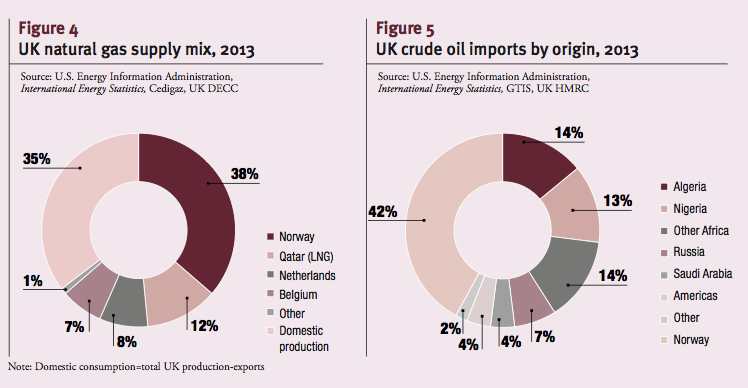
The UK – an Agent of Change in The Middle East?
The UK initially saw the 2011 Arab popular uprisings as a major geopolitical opportunity – a unique moment to remake its relations with the Arab world and to tackle the root causes of extremism in the region. Prime Minister Cameron compared the 2011 ‘Arab spring’ with the fall of Communist regimes in Central and Eastern Europe in 1989.
Historically, the UK has not spent much of its overall development assistance in the Middle East– with the exception of the Palestinian Occupied Territories and Yemen. However, Iraq became the regional focus of UK development efforts from 2003 to 2009 when British troops were deployed there, with a vertical drop of aid volumes to the country after their withdrawal. In the initial aftermath of the 2011 popular uprisings, the UK Foreign and Commonwealth Office (FCO) and the Department for International Development (DFID) established the Arab Partnership Economic Facility (economic development – UK£70 million) and the Arab Partnership Participation Fund (political reform – UK£40 million) – a major increase for UK support for democracy promotion in the region. As shown in Figure 6, the UK also increased its (already very limited) aid to North Africa.
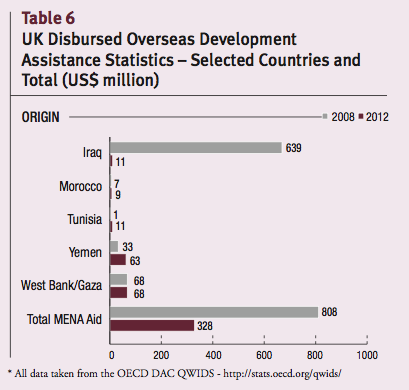
Since 2011, the UK has emerged as a strong backer of the European Neighbourhood Policy (ENP) in the southern Mediterranean – seeing it as a means of advancing UK interests in countries where London does not have strong influence.
In 2011, the UK began to push for a more conditional approach to development assistance under the ENP. British diplomats have argued that, although constant relations must be maintained with reform laggards such as Egypt and Algeria, special EU funds – such as those under the Support to Partnership, Reform and Inclusive Growth (SPRING) mechanism – should only be paid to genuine reformers.
Today, however, British hopes for the region are being scaled down. There is a broad feeling that relations with important strategic actors such as Egypt cannot be jeopardised over concerns about democracy and human rights. The rise of terrorist movements such as al-Qaeda in the Islamic Maghreb (AQIM) and Islamic State (IS) have drawn the UK closer not only to old allies such as Jordan and Bahrain, but also to new partners like Algeria, with whom the UK recently signed a security partnership.
The planned re-opening of the UK Embassy in Tehran at the end of 2014 has prompted a preliminary discussion on improving economic ties if there is a deal on the nuclear issue – Iran was a major trade partner in the region until the Islamic Revolution of 1979. In September 2014, David Cameron met with President Hassan Rouhani – the first such meeting between the two countries’ leaders in more than three decades – where they discussed operations against IS in Iraq and future trade relations in the event of an agreement over Iran’s nuclear programme.
In August 2013, Prime Minister David Cameron lost a vote in the British parliament that would have authorised the bombing of the Syrian military and its allies – in direct response to the use of chemical weapons by the regime of Bashar al-Assad in rebel-held areas. Earlier the British and French governments had found themselves in a highly acrimonious debate with other EU member states in Brussels over whether to lift an EU embargo on sending arms to opposition groups in Syria. In May 2013, some EU sanctions were lifted. But the subsequent advances of Islamist extremists in Syria and Iraq in 2014 changed the debate; London’s plans to substantially increase its military assistance to opposition forces in Syria were quietly shelved amid concerns that weapons could fall into the hands of Islamic extremists. On 26 September 2014, David Cameron secured the British parliament’s consent to begin a bombing campaign against IS forces in Iraq.
As the UK prepared its military campaign against the IS organisation, London – together with Paris and Washington – successfully petitioned Saudi Arabia, the UAE and Bahrain to join the air campaign. However, Cameron, unlike the US, ruled out attacks against the same group in Syria. Hesitant to work with or provide any advantage to the Assad regime, but equally conscious of the hundreds of British citizens fighting with IS and other extremist groups, the UK has simply run out of good options in Syria.
The Exceptional Gulf
Britain’s enthusiasm for Arab spring regime change did not extend to the Gulf. For example, in 2011 British leaders praised the UAE for taking part in NATO’s aerial assault to help liberate Libya from Gaddafi’s forces. But the UK government subsequently ignored a 2012 crackdown against civil society activists in the UAE. Some Members of the European Parliament (MEPs) from Prime Minister Cameron’s own Conservative Party went so far as to vote against a resolution condemning the arrest and arbitrary detention of UAE civil society activists.
The 2010 ‘Gulf Initiative’ was a signal of intent by the new Conservative-led government of David Cameron to re-build strong political ties with the six GCC states. Since 2010 the UK has signed commercial and defence agreements with each of the GCC member-states. A number of Royal Navy ships and submarines/Royal Air Force aircraft are normally based in the region and there are high-levels of counter-terrorism and military cooperation, including joint exercises between the UK Armed Forces with some Gulf militaries – most frequently with Saudi Arabia and Oman.
Despite such high levels of security cooperation, senior UK government officials recognise that the Gulf is part of the problem as well as part of the solution, especially when it comes to the funding of terrorist groups in Iraq, Syria, Lebanon, Pakistan and elsewhere by the security services and private citizens from Gulf countries.
The UK is susceptible to considerable diplomatic pressure from the Gulf. In 2014, David Cameron ordered an investigation into the alleged role of the Muslim Brotherhood in fomenting violent extremism in the UK and around the world. The inquiry was largely seen as a sop to Riyadh. Meanwhile, the UK continues to develop working relations with the Muslim Brotherhood elsewhere, including in Tunisia and Yemen, where Brotherhood members have served as government ministers.
On balance, the UK government believes that maintaining generally friendly relations with Saudi Arabia and other Gulf countries is better than a confrontational approach that would yield little in the way of human rights, harm UK security and commercial ties and would indirectly strengthen regime hardliners and extremists.
Conclusion
The UK’s priorities in the Middle East are unlikely to change over the next decade. Attempts at regime change by full-scale military intervention or by as- sisting local insurgents to overthrow regimes are seen to have failed, most critically in the case of Iraq and Libya, and have led to a rise in extremist movements. London has reverted to a much more cautious ap- proach towards regime change in the region.
Two major recent shifts in British policy towards the region have been with non-Arab states, namely Iran and Israel. Engagement with Iran is set to increase following the re-establishment of full diplomatic relations between the two countries, but much rests on the successful resolution of talks over Iran’s
nuclear programme. Conversely, UK relations with Israel have substantially deteriorated – and will likely continue to do so if Israel continues to build more settlements and cause more civilian casualties among the Palestinian population.
Britain is willing to risk some influence over matters of principle with strategically important countries in the Middle East; the UK has condemned the use of excessive force on the part of countries such as Bahrain and Egypt – even if it has then moved quickly to try to repair relations afterwards. London is willing to gently chastise long-standing allies such as Jordan for stalling on reforms and even withdraw limited amounts of funds. However, aside from occasional grumblings and limited reform initiatives, it is clear that the UK is not willing to sacrifice key interests in the region in order to take a strong stand on human rights issues. This is particularly true in the case of the most strategically important countries in the region such as Egypt, Saudi Arabia and the UAE.
The security and economic rationale of developing cooperation with these governments in the short- term continues to be compelling. The importance of the Gulf has been reinforced since the Arab uprisings. The UK desperately wants to capitalize on its growing economic ties with the UAE and other GCC countries as part of the government’s push to increase global trade. In that sense, British foreign policy towards the Arab countries has remained relatively constant despite the tumultuous events of recent years.
About the author:
*Edward Burke is Associate Fellow at FRIDE.
Source:
This article was published by FRIDE as Policy Brief 186 (PDF)
This Policy Brief belongs to the project ‘Transitions and Geopolitics in the Arab World: links and im- plications for international actors’, led by FRIDE and HIVOS. We acknowledge the generous support of the Ministry of Foreign Affairs of Norway. For further information on this project, please contact: Kawa Hassan, Hivos ([email protected]) or Kristi- na Kausch, FRIDE ([email protected]).

